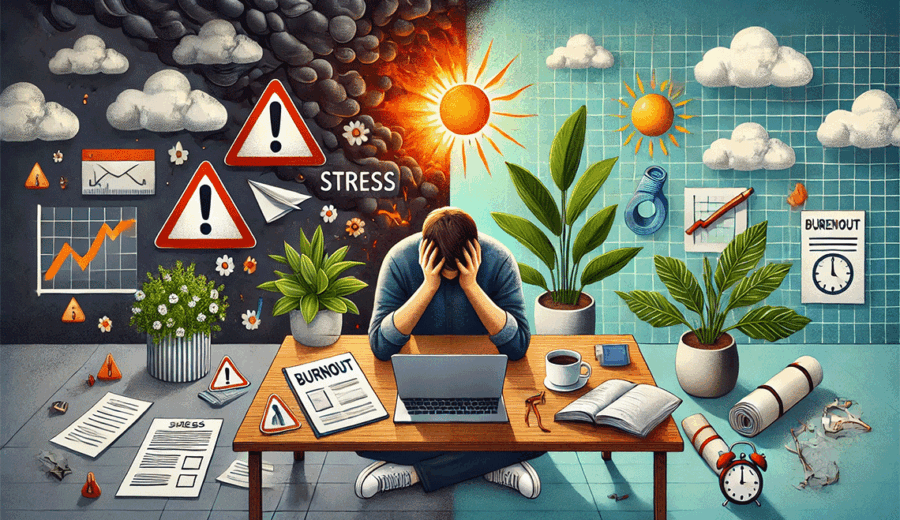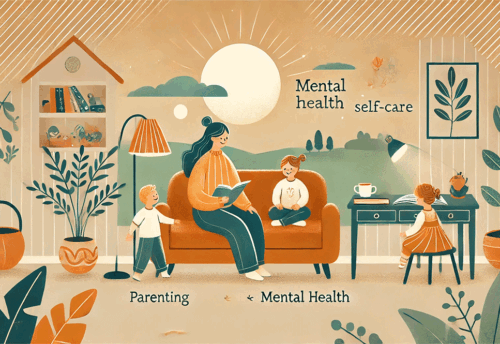
Recognizing and Managing Burnout
Recognizing and Managing Burnout
Burnout is a state of physical, emotional, and mental exhaustion caused by prolonged stress and overwork. It affects individuals across all walks of life and can significantly impact mental health and overall well-being. Understanding the symptoms and learning to manage and prevent burnout is essential for maintaining a balanced and healthy life.
What is Burnout?
Burnout is more than just feeling tired or overwhelmed. It’s a condition that develops over time due to constant stress and lack of balance, often resulting in feelings of detachment, helplessness, and reduced productivity.
Symptoms of Burnout
Burnout manifests in three main dimensions: physical, emotional, and behavioral. Recognizing the signs is the first step toward addressing it.
- Physical Symptoms:
- Chronic fatigue or lack of energy, even after rest.
- Frequent headaches, muscle pain, or gastrointestinal issues.
- Changes in sleep patterns—either insomnia or oversleeping.
- Emotional Symptoms:
- Feelings of detachment, cynicism, or negativity about work or life.
- Emotional exhaustion and difficulty managing stress.
- Increased irritability or mood swings.
- Behavioral Symptoms:
- Decreased performance and difficulty concentrating.
- Withdrawing from responsibilities, family, or social activities.
- Reliance on unhealthy coping mechanisms, such as overeating or substance use.
Impact of Burnout on Mental Health
Burnout can escalate into more severe mental health challenges if left unaddressed:
- Anxiety: Persistent stress can trigger chronic worry and fear.
- Depression: Feelings of hopelessness and helplessness may develop over time.
- Physical Health Risks: Prolonged burnout increases the risk of heart disease, high blood pressure, and immune system suppression.
Steps to Recover from Burnout
- Acknowledge the Problem:
- Recognize that you’re experiencing burnout and identify the underlying causes.
- Accept that it’s okay to feel overwhelmed and need a break.
- Seek Support:
- Share your feelings with friends, family, or a trusted colleague.
- Consider professional help, such as therapy or counseling, for guidance.
- Rest and Rejuvenate:
- Prioritize sleep and rest to allow your body and mind to recover.
- Take a break from work or responsibilities if possible, even for a short period.
- Reevaluate Priorities:
- Identify and focus on what truly matters, letting go of unnecessary tasks or commitments.
- Set realistic goals and boundaries to avoid overcommitting.
- Engage in Self-Care:
- Incorporate regular physical activities, such as walking or yoga, to reduce stress.
- Practice mindfulness techniques like meditation or journaling to clear your mind.
- Reconnect with Joy:
- Spend time doing things you love, whether it’s a hobby, reading, or socializing.
- Rekindle your passion for work or personal projects by finding purpose and meaning.
Preventing Burnout
- Set Healthy Boundaries:
- Learn to say “no” when your plate is full, and communicate your limits clearly.
- Disconnect from work emails or calls during non-working hours.
- Maintain a Work-Life Balance:
- Dedicate time to family, hobbies, and relaxation.
- Avoid overworking by setting structured schedules and taking regular breaks.
- Develop Coping Mechanisms:
- Build resilience by practicing stress-management techniques like deep breathing or progressive muscle relaxation.
- Cultivate a strong support network to lean on during tough times.
- Stay Organized:
- Use tools like planners or apps to manage tasks efficiently and reduce stress.
- Prioritize tasks and tackle them step-by-step to avoid feeling overwhelmed.
- Invest in Your Well-Being:
- Ensure a healthy lifestyle by eating balanced meals and staying hydrated.
- Focus on mental well-being with regular self-reflection and gratitude practices.
Final Thoughts
Burnout is a serious condition that requires attention and care to overcome. By recognizing its symptoms, addressing its causes, and adopting strategies for prevention and recovery, individuals can regain control over their mental and physical well-being. Prioritizing balance and self-care is key to leading a fulfilling and sustainable life.
Feel free to use the provided image to visually represent the journey from burnout to recovery and inspire mindful practices in your audience.





Leave a Reply